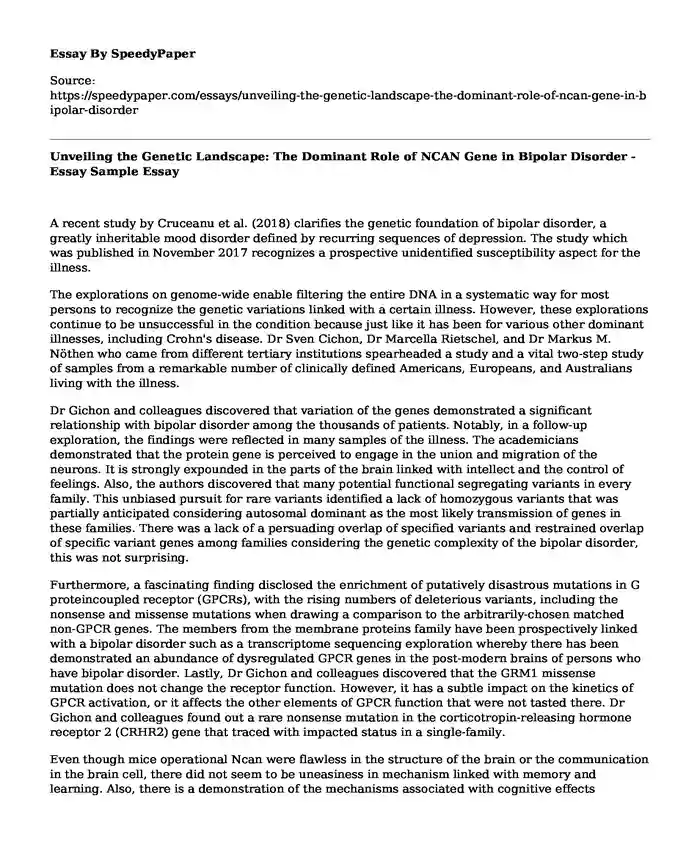
| Type of paper: | Essay |
| Categories: | Genetics Bipolar disorder Disorder |
| Pages: | 3 |
| Wordcount: | 557 words |
A recent study by Cruceanu et al. (2018) clarifies the genetic foundation of bipolar disorder, a greatly inheritable mood disorder defined by recurring sequences of depression. The study which was published in November 2017 recognizes a prospective unidentified susceptibility aspect for the illness.
The explorations on genome-wide enable filtering the entire DNA in a systematic way for most persons to recognize the genetic variations linked with a certain illness. However, these explorations continue to be unsuccessful in the condition because just like it has been for various other dominant illnesses, including Crohn's disease. Dr Sven Cichon, Dr Marcella Rietschel, and Dr Markus M. Nöthen who came from different tertiary institutions spearheaded a study and a vital two-step study of samples from a remarkable number of clinically defined Americans, Europeans, and Australians living with the illness.
Dr Gichon and colleagues discovered that variation of the genes demonstrated a significant relationship with bipolar disorder among the thousands of patients. Notably, in a follow-up exploration, the findings were reflected in many samples of the illness. The academicians demonstrated that the protein gene is perceived to engage in the union and migration of the neurons. It is strongly expounded in the parts of the brain linked with intellect and the control of feelings. Also, the authors discovered that many potential functional segregating variants in every family. This unbiased pursuit for rare variants identified a lack of homozygous variants that was partially anticipated considering autosomal dominant as the most likely transmission of genes in these families. There was a lack of a persuading overlap of specified variants and restrained overlap of specific variant genes among families considering the genetic complexity of the bipolar disorder, this was not surprising.
Furthermore, a fascinating finding disclosed the enrichment of putatively disastrous mutations in G proteincoupled receptor (GPCRs), with the rising numbers of deleterious variants, including the nonsense and missense mutations when drawing a comparison to the arbitrarily-chosen matched non-GPCR genes. The members from the membrane proteins family have been prospectively linked with a bipolar disorder such as a transcriptome sequencing exploration whereby there has been demonstrated an abundance of dysregulated GPCR genes in the post-modern brains of persons who have bipolar disorder. Lastly, Dr Gichon and colleagues discovered that the GRM1 missense mutation does not change the receptor function. However, it has a subtle impact on the kinetics of GPCR activation, or it affects the other elements of GPCR function that were not tasted there. Dr Gichon and colleagues found out a rare nonsense mutation in the corticotropin-releasing hormone receptor 2 (CRHR2) gene that traced with impacted status in a single-family.
Even though mice operational Ncan were flawless in the structure of the brain or the communication in the brain cell, there did not seem to be uneasiness in mechanism linked with memory and learning. Also, there is a demonstration of the mechanisms associated with cognitive effects observed in the illness. Dr Gichon and colleagues warn that Ncan-insufficient mice require to be assessed for further changes in the brain and defects in the behaviour.
Dr Cichon concludes that the results offer convincing proof that the variation of genes is the gene NCAN is a dominant risk factor for bipolar disorder. More research is required to learn the biological concept of NCAN and how NCAN variants distort the neuronal processes among patients who have bipolar disorder.
Cite this page
Unveiling the Genetic Landscape: The Dominant Role of NCAN Gene in Bipolar Disorder - Essay Sample. (2024, Jan 14). Retrieved from https://speedypaper.com/essays/unveiling-the-genetic-landscape-the-dominant-role-of-ncan-gene-in-bipolar-disorder
Request Removal
If you are the original author of this essay and no longer wish to have it published on the SpeedyPaper website, please click below to request its removal:
- Free Essay Example on Kashmir Dispute
- An Ethnographic Account that Examines Social Relational Categories, Anthropology Essay Sample
- Essay Example on Designing Modern Transport System Friendly to Pedestrian
- Essay Sample: Earth Elements by the use of Activated Carbon
- Justification of Power of Absolute Monarch - Free Essay Example
- Critical Review of PTSD. Essay Example
- Patient Data Instrument - Paper Sample
Popular categories




